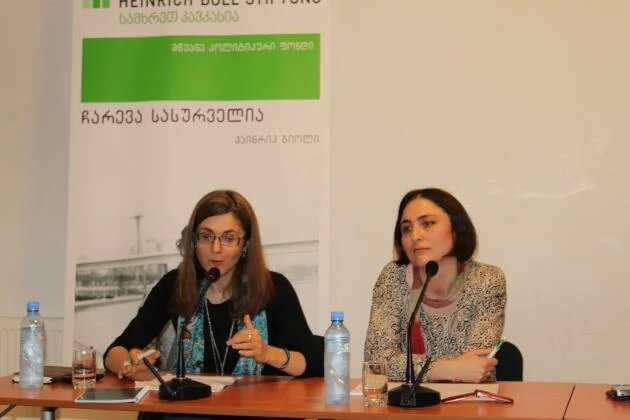
The public discussion on liberalism and liberal values held at the Heinrich Boell Foundation on 30 May, 2012 focused on society’s attitudes towards these values and its readiness or reluctance to accept them. The speakers included Ms. Salome Asatiani, a Radio “Freedom” Correspondent, Ms. Shorena Shaverdashvili, Editor of “The Liberali”, and Mr. Gela Bandzeladze, representing the political party Social-Democrats for Development of Georgia. The issues debated involved such problems as the extent to which the government that came to power due to the 2003 Rose Revolution promoted liberal values. The roles of the political elites and think tanks in transforming Georgian society, particularly the country’s cultural life were also discussed.
The topic of the discussion was “Discrediting Idea: What Liberalism Means in Georgia”. The question on responsibility for misinterpreting of Western values is still severe after the Revolution, as the general public still associates their acceptance with rejection of traditions. Ms. Salome Asatiani believes that in 2003 the whole country missed a very rare and significant moment, since the society may have been ready then to initiate discussion on these topics. The discussion did not occur, even though its initiation was so vital considering the post-Soviet environment in which the country found itself in 2003. The latter was characterized by a number of faulty features including chauvinism, ethnic nationalism, and religious obscurantism.
Why has the idea of liberalism been discredited? In Ms. Asatiani’s opinion, to begin with, the fault lies with the government that came to power in the name and pursuance of this idea and values, but shortly thereafter started taking steps opposite to what it had declared. Was this a communication problem or a thoroughly intended tactic? Did it serve as a caution to avoid discussions of unpopular topics with a wider public or to take concrete steps to recognize the attitudes characteristic of a post-Soviet society? What role does the Georgia’s Orthodox Church play in this struggle of ideas and values, as one of the most influential institutions that mostly takes anti-liberal, xenophobic, chauvinist positions and rests its rhetoric upon nationalism? Ms. Asatiani also spoke about the government depriving the society of room for thought and discussion.
In Georgia, when speaking not only about liberalism, but also about political topics, the dilemma usually lies where the problem stands. Why do we not like the reality we live in? Does the problem lie in the people responsible for the current system or in the tendency or system discourse that influences these people? Does the government cause these problems or is the government itself a logical outcome of misguided development? What is necessary to break through this undesired reality? Mr. Gela Bandzeladze, Political Secretary of the Political Party “Social-Democrats for Development of Georgia”, focused on these topics in his speech. He considers that the problem lies not only in people and poor governance but also in the country’s development trends which exclude liberal values.
Mr. Bandzeladze also discussed liberal values and the rules of liberal games. “When talking about values, I mean individualism, tolerance towards the other, pluralism, etc., including the type of values that relate to an individual’s personality and conscience. Under liberal procedures, I mean both rules of the game of economics, i.e. its set-up, and rules of the political game. Also important are questions of whether there is a democracy in place; how the institutions are established and dissolved, etc.; and how the citizens and citizen unions interact on the political arena”, explained the speaker.
As opposed to Ms. Asatiani and Mr. Bandzeladze, who focused on the responsibility of the government that came to power in the name of liberal values, and anti-liberal development trends, the third speaker, Ms. Shorena Shaverdashvili, mainly stressed society’s responsibility. Her arguments focused on “identification” of the liberals and on issue whether it is possible to make such a distinct categorization at all. “Why did this (social) group lose social sensitivity and responsibility and why did it become alienated and isolated from the society and the country context, like the government which lost this sensitivity since liberalism became plain rhetoric to it?” Ms. Shaverdashvili also explained why “The Liberali” magazine was given its name and underlined that this was “an attempt to save this system of values while political dominion doomed it to destruction”.
The group of “liberal elites”, however, isolated itself. “They consider the topics that are of concern to the society and a large part of the country to be uninteresting. The liberal groups of society locked themselves in their narrow particular circles like the government and the church did”, considers Ms. Shaverdashvili. “We ourselves, by stewing in our own juice, supported the marginalization of the idea of liberalism as we operate by clichés such as ‘the society is ignorant’, ‘the church is obscurant’, etc. Only result of operation with these clichés is marginalization of liberal ideas”.